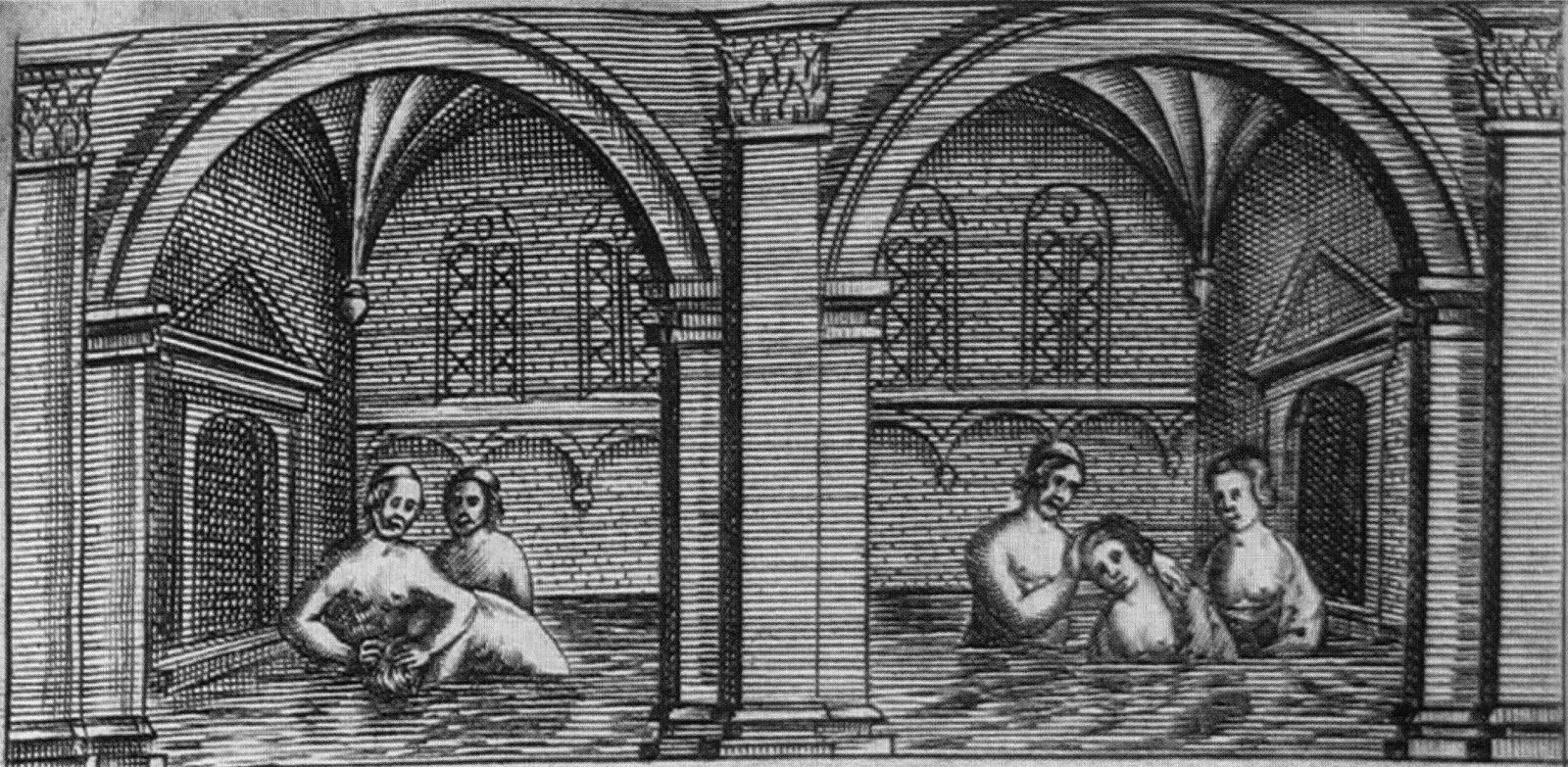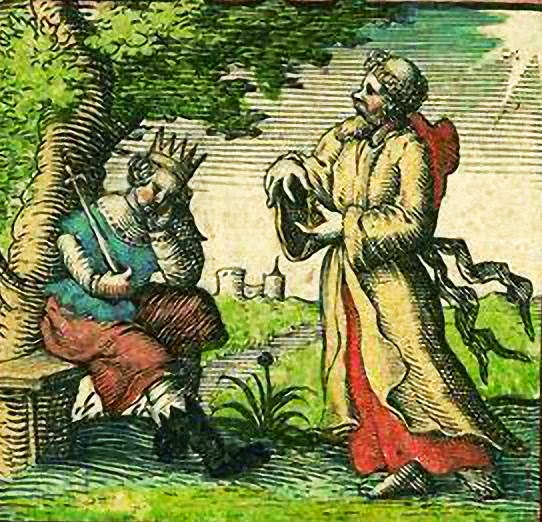 |
| "Menno Simons from Friesland" 1608 engraving by Christoffel van Sichem |
The Mennonites are a cursed sect of the Anabaptists led by a former priest named Menno Symons -- seize and apprehend him and throw him in prison!
 |
| Alsatian Mennonite woman, from the 18th or 19th century. Plate from the collection "Costumes de divers pays" (Clothing of various countries), Lanté et Gatine (1827) - The Alsatian Museum, Strasbourg |
"The error of the cursed sect of the Anabaptists … would doubtless be and remain extirpated, were it not that a former priest Menno Symons … has misled many simple and innocent people," complained a letter to the regent of the Netherlands in 1541. "To seize and apprehend this man we have offered a large sum of money, but until now with no success. Therefore we have entertained the thought of offering and promising pardon and mercy to a few who have been misled … if they would bring about the imprisonment of the said Menno Symons."
The Emperor joins the witch hunt but Menno is never caught
 |
| Rembrandt, The Mennonite Preacher Anslo and his Wife, 1641 |
Holy Roman Emperor Charles V joined in the hunt, offering 100 gold guilders for Menno's arrest. One Dutch man was broken on the wheel and executed merely for allowing Menno to stay with him. But the former priest, a pacifist armed with ideas but no weapons, was never caught. Instead, he led the Anabaptists out of their radical, violent, millennialist fantasies into a moderate, devotional, pacifist movement. Neither the first nor the most original interpreter of the radical Reformation's Anabaptism, he was such an outstanding leader that the movement today is known by his name: Mennonites.
Menno starts out refusing to read the Bible
Little is known about Menno's early life until his ordination as a priest at age 28. Though educated in a monastic school and trained for ministry, he had never even touched the Scriptures. "I feared if I should read them they would mislead me," he later wrote. "Behold! Such a stupid preacher was I for nearly two years."
The church Menno was born into deceived him
 |
| Birth of Mennonite movement by Ammon Monroe Aurand, Jr., 1938 |
After those two years, he had a crisis of faith. The bread and wine he dispensed at each Mass did not seem to transubstantiate into Christ's body and blood as Roman Catholic doctrine taught. He figured such thoughts had been suggested by the Devil, and prayed for God to ward them off. "Yet, I could not be freed from this thought," he wrote. "Finally, I got the idea to examine the New Testament diligently. I had not gone very far when I discovered that we were deceived, and my conscience, troubled on account of the aforementioned bread, was quickly relieved."
Menno leaves the church he was born into to preach the Word of God but continues to gamble and drink
 |
| Portrait of the Amsterdam Mennonite Brak family, Tibout Regters (1710–1768) |
Believing the Bible to be authoritative, Menno developed the reputation as an "evangelical" preacher. "Everyone sought and desired me," he recounted. "It was said that I preached the Word of God and was a good fellow." But to Menno, it was a lie; his life was still empty and full of "diversions" like gambling and drinking.
Menno cannot find any infant baptism in the Bible
 |
| Alles begann mit Ansgar. Hamburgs Kirchen im Spiegel der Zeit (Hamburg: Pressestelle der Freien und Hansestadt Hamburg, 2006), p. 48, 1750. |
Three years later, an otherwise unknown Leeuwarden Anabaptist was beheaded, sending Menno into another spiritual crisis. "It sounded very strange to me to hear of a second baptism," he wrote. "I examined the Scriptures diligently and pondered them earnestly but could find no report of infant baptism." Again, he wrote, "I realized that we were deceived." But his life changed little: "I spoke much concerning the Word of the Lord, without spirituality or love, as all hypocrites do."
Anabaptists capture a town and are willing to die for their beliefs
 |
| The burning of a 16th-century Dutch Anabaptist, Anneken Hendriks, who was charged by the Spanish Inquisition with heresy. |
Eventually, he was hit with a final crisis. Three hundred violent Anabaptists, dreaming of the imminent end of the world and attempting to escape persecution, captured a nearby town—and were savagely killed by the authorities. Among the dead was Menno's brother, Peter.
"I saw that these zealous children, although in error, willingly gave their lives and their estates for their doctrine and faith … But I myself continued in my comfortable life and acknowledged abominations simply in order that I might enjoy comfort and escape the cross of Christ."
Menno preaches Anabaptist theology from his Catholic pulpit
 |
| Menno Simons, Leipzig, 1854. |
The realization led to an emotional, tearful cry to God for forgiveness. For nine months thereafter he essentially preached Anabaptist doctrine from his Catholic pulpit, until he finally left the church and (a year later) fully cast his lot with the radical Reformers.
Even Protestant Reformers like Martin Luther and John Calvin oppose the Anabaptists
 |
| Historical drawing of the execution of the leaders of the Münster rebellion. In the background the cages are already in place at the old steeple of St. Lambert's church |
At the time, however, Anabaptists were unloved by all. Even Protestant Reformers like Martin Luther and John Calvin opposed them as "fanatics," "scatterbrains," and "asses"—just as bad as the papists. Those feelings weren't helped in 1535 when a despotic Anabaptist leader took over the town of Münster, ruling as a cruel theocratic dictator until Catholic and Protestant troops overran the city in bloody battle.
Menno leaves the Catholic church and is ordained as an Anabaptist
 |
| Photograph of an old order Mennonite, horse and carriage in Oxford County, Ontario, Canada by Allan Walker, 2006. |
Menno was as worried about the violent Anabaptists as anyone and had even tried to stem their fanaticism as a priest. Sympathetic, he knew they had zeal without knowledge. But once he left the Catholic church, he met a group of peaceful Anabaptists who strongly opposed Münsterite thinking. He joined them and was ordained.
Menno spreads Anabaptist propaganda throughout the Netherlands and Germany
 |
| George W. Bush meets with Amish and Mennonite residents in Lancaster, PA. Date : Wednesday, Aug. 16, 2006. White House photo by Kimberlee Hewitt |
For the rest of his life, Menno (and, later, his wife and his children) lived in constant danger as heretics. He traveled throughout the Netherlands and Germany, writing extensively and establishing a printing press to circulate Anabaptist teaching. He took the Bible extremely literally, sometimes even legalistically; though he defended the doctrine of the Trinity in a small book, he refused to use the term because it did not appear in Scripture.
Menno defends the faith against Catholic and Protestant attacks
 |
| Portrait of Jan van Leiden (Anabaptist Leader) as King of Münster by Heinrich Aldegrever, in prison shortly before his execution, 1536. Menno wrote The Blasphemy of Jan van Leyden |
Menno is a pacifist
 |
| Detail of portrait of the regents of the Mennonite orphanage, Haarlem, 1834. Jan Adam Kruseman (1804–1862) |
The Christian's duty was to suffer, not fight, Menno believed. "If the Head had to suffer such torture, anguish, misery, and pain," he asked, "how shall his servants, children, and members expect peace and freedom as to their flesh?"
Menno practices shunning of excommunicated church members
.jpg) |
| Mennonite on the cell phone, Serge Melki from Indianapolis, USA, 2010. |
In his later years, he was occupied with other internal Mennonite struggles, mainly over shunning excommunicated church members. But in each of his writings (more than 40 survive), he began by quoting Paul's letter to the Corinthians: "No other foundation can any one lay than that which is laid, which is Jesus Christ." He finally laid his pen down at age 66, as he became ill on the twenty-fifth anniversary of his renunciation of the Catholic church. The next day, he died a natural death. Today nearly 900,000 Mennonites follow his teachings.
Source: Galli, Mark and Ted Olson, eds. 131 Christians Everyone Should Know. Nashville: B&H Publishing Group, 2000, pages 166-168.








